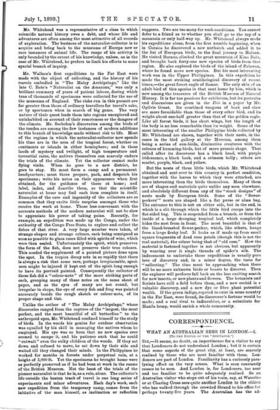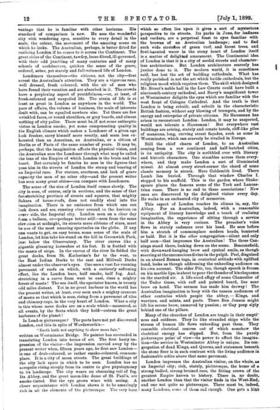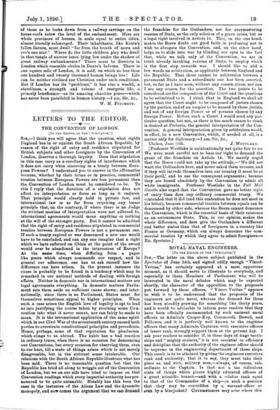CORRESPONDENCE.
WHAT AN AUSTRALIAN SEES IN LONDON.—I, (To THE EDITOR OF' THE "SPECTATOR."] Sin,—It seems, no doubt, an impertinence for a visitor to say that Londoners do not understand London ; but it is certain that some aspects of the great city, at least, are scarcely realised by those who are most familiar with them. Lon- doners are part of London. Familiarity has a curiously para- lysing effect on the very senses. What is seen constantly ceases to be seen. And London is, for Londoners, too near and too familiar to be quite adequately realised. So an Australian visitor who steps out of his train, say, at Waterloo or at Charing Cross sees quite another London to the citizen who has walked through the crowded Strand to his office for perhaps twenty-five years. The Australian has the ad-
vantage that he is familiar with other horizons. His standard of comparison is new. He sees the wonderful city with wondering eyes, sensitive to every detail in the scale, the colour, the movement of the amazing scene on which he looks. The Australian, perhaps, is better fitted for realising London if he comes to it across the Continent. The great cities of the Continent, tawdry, loose-fibred, ill-governed, with their odd jumbling of many centuries and of many schools of architecture, quicken the sense of the grave, ordered, sober, yet stately and full-volumed life of London.
Londoners themselves—the citizens, not the city—first arrest the Australian's attention. They are a vigorous race, well dressed, fresh coloured, with the air of men who have found their vocation and are absorbed in it. The crowds have a perplexing aspect of youthfulness,—or, at least, of fresh-coloured and unspoiled life. The strain of life is at least as great in London as anywhere in the world. The pace of affairs, the volume of business, the scale of interests dealt with, can be equalled nowhere else. Yet there are few wrinkled faces, or round shoulders, or grey beards, and almost nothing of city pallor. There must be, if not some antiseptic virtue in London smoke, yet some compensating quality in the English climate which makes a Londoner of a given age look fresher, carry himself more erectly, and seem less ex- hausted than an American, an Australian, or a citizen of Berlin or of Paris of the same number of years. It may be, perhaps, that the imagination affects the physical vision, and the Australian sees the Londoner through what may be called the lens of the Empire of which London is the brain and the heart. But certainly he fancies he sees in the figures that pass him in the streets of London the stamp and bearing of an Imperial race. For stature, erectness, and look of grave capacity the men of no other city—and the present writer has seen many great cities—can compare with Londoners.
The sense of the size of London itself comes slowly. The city is seen, of course, only in sections, and the sense of that far-stretching province of streets and squares, that mighty Sahara of house-roofs, does not readily steal into the imagination. There is no eminence from which one can look down and see, running clear around to the horizon on ever v side, the Imperial city. London seen on a clear day flora a balloon, or—perhaps better still—seen from the same elev ttion at midnight, its streets mere ribbons of stars, must be one of the most amazing spectacles on the globe. If any one wants to get, on easy terms, some sense of the scale of London, let him take his stand on the hill in Greenwich Park, just below the Observatory. The river curves like a gigantic gleaming horseshoe at his feet. It is fretted with the masts of ships. In the curves of the river lie folded the great docks, from St. Katherine's far to the west, to the East Indian Docks to the east and Millwall Docks almost under the observer's eyes. One sees a vast far-running pavement of roofs on which, with a curiously softening effect, lies the London haze, half smoke, half fog. And, stretching in a curve from west to east, rises a mighty forest of masts ! The sea itself, the spectator knows, is twenty odd miles distant. Yet in no great harbour in the world has the present writer, at least, ever seen such a mighty crescent of masts as that which is seen, rising from a pavement of tiles and chimney-tops, in the very heart of London. What a city is this whose mere docks are on a scale which—measured, at all events, by the fleets which they hold—outrun the great harbours of the planet !
Is London picturesque ? The poets have not yet discovered London, and this in spite of Wordsworth's-
" Earth bath not anything to show more fair,"
written on Westminster Bridge. No painter has succeeded in translating London into terms of art. The first hasty im- pression of the visitor—the impression carried away by the present writer when, fifteen years ago, he first saw London— is one of drab-coloured, or rather smoke-coloured, common- place. It is a city of mean streets. The great buildings of the city lack space in which to be seen. London has no acropolis rising steeply from its centre to give physiognomy to its landscape. The city wears an obscuring veil of fog. Its Abbey, and the great moon-like dome of St. Paul's, are smoke-tinted. But the eye grows wiser with seeing. A closer acquaintance with London shows it to be amazingly rich in all the elements of the picturesque. The very haze which so often lies upon it gives a sort of mysterious perspective to its streets. Its parks in June, for leafiness and verdure, are a perpetual feast to eyes familiar with the browns of an Australian landscape; and to find such wide stretohes of green turf, and forest trees, and fowl-haunted water in the stony heart of London itself is a matter of delighted amazement. The Continental idea of London is that it is a city of sordid streets and character- less architecture. But London architecture scarcely has justice done to it. The modern world, it is sometimes said, has lost the art of building cathedrals. What has really perished is not the art which builds cathedrals, but the religious mood which requires them. The skill which designed Mr. Street's noble hall in the Law Courts could have built a nineteenth-century cathedral, and Barry's magnificent tower at Westminster delights the eyes which are familiar with the west front of Cologne Cathedral. And the truth is that London is being rebuilt, and rebuilt in the characteristic British fashion, without any blowing of trumpets, and by the energy and enterprise of private citizens. No Haussman has arisen to reconstruct London : London, it may be suspected, would not tolerate a Haussman ! But everywhere vast buildings are arising, stately and ornate hotels, cliff-like piles of mansions, long, curving street façades, such as some in Westminster, which can scarcely be rivalled in Europe.
Still the chief charm of London, to an Australian coming from a raw continent and half-hatched cities, is its antiquity. The city is scribbled over with literary and historic characters. One stumbles across them every- where, and they make London a sort of illuminated missal. At almost every street-corner the chord of some classic memory is struck. Here Goldsmith lived. There Lamb lies buried. Through that window Charles L stepped to his scaffold. This is the garden where Shake- speare places the famous scene of the York and Lancas- trian roses. There is no end to these associations ! New ones are discovered by the delighted visitor every day. He walks in an enchanted city of memories.
This aspect of London reaches its climax in, say, the Abbey. For an Australian, indeed, with a reasonable equipment of literary knowledge and a touch of realising imagination, the experience of sitting through a service in the Abbey is very curious. The preacher's voice flows in stately cadences over his head. He sees before him a stretch of commonplace modern heads, bonneted. or bald. But it is the other congregation—silent and only half seen—that impresses the Australian! The three Can. nings stand there, looking down on the scene. Beaconsfield, with downward-hanging brow and cynical smile, as though sneering at the unconscious divine in the pulpit. Peel, disguised in an absurd Roman toga, in oratorical attitude with uplifted hand, looks as though addressing the unheeding audience on his own account. The elder Pitt, too, though speech is frozen on his marble lips, is about to pour the thunder of his eloquence on the startled air. A life-sized effigy of some Chancellor of the Tudor times, with ruff and pointed beard, lies near brow on hand. The sermon has made him drowsy ! The Australian imagination is busy with the unseen audiences of other centuries which people the abbey, — Kings, and warriors, and saints, and poets. There Ben Jonson might lift his serene brow, unmoved by passion ; or Gay peep slyly behind one of the pillars.
Many of the churches of London are tragic in their empti- ness and coldness. They lie like stranded ships while the stream of human life flows unheeding past them. They resemble electrical centres out of which somehow the electrical energy has slipped. But, from the purely picturesque point of view—its power to affect the imagina- tion—the service in Westminster Abbey is unique. Its con- gregation of dead Kings, and Queens, and statesmen beneath the stone floor is in such contrast with the living audience in fashionable attire above that same pavement.
London impresses the Australian visitor, on the whole, se an Imperial city ; rich, stately, picturesque, the home of a strong-bodied, strong-brained race, the fitting crown of the greatest Empire known to history. There is, no doubt, another London than that the visitor finds in the West-End, and one not quite so picturesque. There must be, indeed, many London; some vf them sad enough. One gets a hint of these as he looks down from a railway carriage on the house-roofs below the level of the embankment. Here are whole provinces of houses, in scale equal to entire cities, almost literally submerged. Their inhabitants, like Keats's fallen Saturn, must dwell "far from the breath of morn and eve's one star." Where do the little children play who dwell in that tangle of narrow lanes, lying low under the shadow of great railway embankments ? There must be districts in London which resemble circles in Dante's Inferno. There is one square mile of London, it is said, on which no lees than one hundred and twenty thousand human beings live ! Life can be neither civilised nor Christian under such conditions. Bat if London has its "problems," it has also a wealth, a stateliness, a strength and volume of energetic life, a princely beneficence—as its amazing charities prove—which has never been paralleled in human history.—I am, Sir, &c.,
W. H. FITCHETT.

















































 Previous page
Previous page